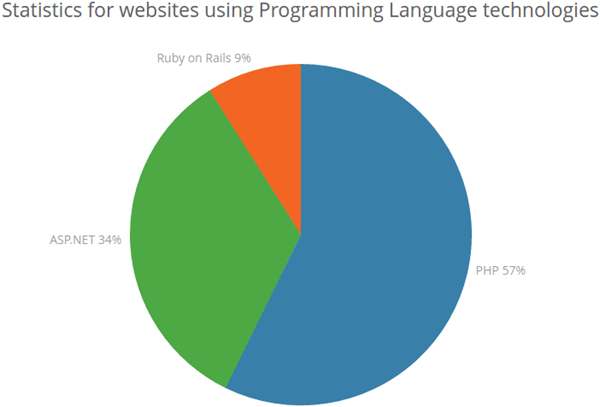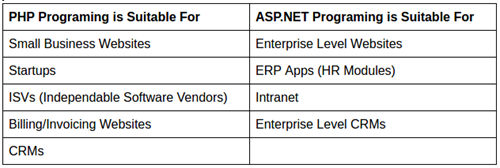A Comparison Between PHP and ASP.NET for the Layperson
Comparing PHP to ASP.NET is a challenging task. Taking a deep dive, I found both camps are biased and strictly promote one or the other language. Although I do not possess expert coding skills, I have worked with both technologies, and I can come at this from an unbiased viewpoint for an informative and fair comparison in terms a layperson would appreciate.
ASP.NET is an open-source server-side web application framework designed for web development to produce dynamic web pages. It was developed by Microsoft to allow programmers to build dynamic web sites, web applications and web services. Unlike PHP, ASP.NET isn’t a programming language per se, but rather a ‘framework’, which is a type of programming methodology. In fact, ASP.NET itself supports any .NET language as part of its workflow. The language used for ASP.NET is generally C#.
As you may know, frameworks are basically libraries of code with specific purposes. There’s no point in starting from scratch if you don’t have to, so using frameworks to build your site is a great start.
ASP.NET Key Features:
- Windows-based framework
- Enables users to build web forms, create APIs, and put together dynamic websites
- Requires the use of the Visual Studio Integrated Development Environment (IDE)
- Known for its high performance
- Fully open-source
PHP was started by developer Rasmus Lerdorf a couple of decades ago. PHP stands for Personal Home Page. So the idea at that time was to build small homepages for people, not for building large scale applications. PHP is an open-source programming language with plenty of applications, the most popular of which happens to be web development. For PHP to work, you’ll need to set up an interpreter. Unlike ASP.NET, PHP happens to be entirely cross-platform, so there are no limitations to what type of server you can use the language on.
PHP Key Features:
- Cross-platform, server-side language
- Widely used around the web
- Enables its users to build all sorts of web applications
- Can be embedded into HTML files
- Doesn’t require the use of a particular IDE to develop applications
- Completely open-source
Currently, PHP is the world's most used and popular language on the Internet with millions of dedicated PHP web apps development companies. As of March 2017:

common criteria when comparing PHP and ASP.NET:
Scalability and Maintenance: The simple fact is that whether you choose PHP or ASP.NET, the web application scalability and ease of maintenance depend on the following: The programmer proficiency; Use of a solid framework; Following industry best standards and programming guidelines along with deploying best coding standards.
Some of the most heavily trafficked websites in the world like Facebook and Wikipedia are powered by PHP and on the other hand websites like Microsoft and StackOverflow are built using ASP.NET. So both ASP.NET and PHP fare somewhat similar in this category.
Performance and Speed: There is a prevalent misconception that performance and site speed depend on either platform. However, there is very little difference between the performance of a PHP-run site or an ASP.NET site. Both ASP.NET and PHP are well equipped to run the routine processes and produce the desired results – accessing file systems, finding images and displaying the pages.
The speed is reliant on several factors including the database server, end user’s computer and bandwidth. There is also the argument that PHP is a faster language at core level. But core language speed is no longer any issue because of fast modern hardware has become. The slight gain in performance is not really what makes the application fast or slow. It is in fact how the code is written and how the architecture implements it that matter.
Support: PHP is open-source and has a far larger pool of developers compared to ASP.NET. However, both have a vast community with thousands of developers that post regularly to forums. If you are ever stuck with a query in PHP or ASP.NET, you will find both communities equally useful. Considering that ASP.NET community mostly comprises dedicated developers, the number of support contributors who are available to post at a given time might be slightly lower than that of PHP. You might get a faster response on the PHP forums and communities.
Cost: This was the only real area that PHP has the major advantage, is it's completely free but ASP.NET being a Microsoft product has some costs associated with the development. You may have to buy Windows OS or if you use Mac or Linux, you can use cross platform mobile frameworks to use ASP.NET on your machine. There has been a perception that Windows hosting is relatively expensive but now Microsoft has free offerings and Windows servers cost nearly the same as Linux servers. Windows has also embraced the open-source and cross-platform movement for a while now.
Development Environment: Integrated development environment is another important factor that needs to be considered from the perspective of cost-effectiveness. As you might be aware, ASP.NET development is executed using the IDE, Visual Studio. Microsoft does offer a free version called VS Express. It might be an ideal choice for beginners, though professional experts look for something more challenging. PHP can be supported by numerous IDE's available for free and paid as well, and can be run on Linux web hosting and can be used with Windows or Mac.
So, to be fair to both PHP and ASP.NET, there are minor gains and losses in either language. The question that most enterprises and businesses should be asking is which language/framework is suitable for their application. Here’s an indication chart that gives you an idea of suitable usage:

Ending Notes
There are some situations where PHP is the right tool for the job, and other situations where ASP.NET is the better fit. Before making the decision on which platform is more suitable, you should ask the following questions:
-
How much budget is available? (Small Budget = PHP, Large Budget = ASP.NET)
-
Which of these technologies does your development team know better (if any)?
-
What are the requirements and end user needs?
After answering these simple questions above you should get a glimpse of understanding which may be better for your business application. There is very little either platform can’t achieve, therefore you should analyze the suitability of each languages rather than by its popularity.

Natalie Evans
Natalie Evans has over 16-years in the tech industry and currently works as the event coordinator and tech reporter for CMS-Connected, keeping up-to-date on what's happening in and around the Content Management industry.